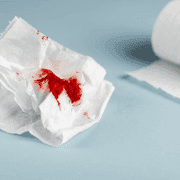Piles Treatment During Pregnancy: A Guide to Causes, Symptoms, and Relief
In This Article
Piles Treatment During Pregnancy: A Guide to Causes, Symptoms, and Relief
Prathibha
Updated on January 20, 2025
Medically verified by Dr. Arya
Fact checked by Dr. Fazeela

Proctology
5 min read
Piles, medically known as hemorrhoids, are swollen veins in the rectal or anal region that can cause discomfort, itching, and bleeding. For many women, the physical and hormonal changes during pregnancy increase the likelihood of developing piles. Understanding the causes, symptoms, and treatment options for hemorrhoids during pregnancy is crucial to ensuring comfort and a smooth experience during this transformative phase. In this blog, Mykare Health takes you through a creative and informative journey to explore effective strategies for managing piles during pregnancy, including lifestyle changes, medical treatments, and advanced care options.
What Causes Piles During Pregnancy?
Pregnancy brings a variety of changes to a woman’s body, some of which contribute to the development of piles. Key causes include
1. Increased Pressure: The growing uterus puts pressure on the pelvic and rectal veins, leading to swelling and inflammation.
2. Hormonal Changes: Elevated progesterone levels during pregnancy cause the walls of veins to relax, making them more prone to swelling.
3. Constipation: Hormonal changes, dietary habits, and prenatal supplements can lead to constipation, a common trigger for piles during pregnancy.
4. Reduced Physical Activity: Decreased movement during the later stages of pregnancy can slow digestion, increasing the risk of hemorrhoids.
Symptoms of Hemorrhoids During Pregnancy
The symptoms of piles can vary in severity and type, but common indicators include
-
Pain or discomfort in the anal region, especially during bowel movements.
-
Itching or irritation around the anus.
-
Swelling or the presence of small lumps near the anal area.
-
Bright red blood during or after bowel movements.
-
A sensation of incomplete bowel evacuation.
These symptoms can be mild or severe, depending on the individual case. Early detection and management can prevent worsening discomfort.
 5 min read
5 min readDon't Ignore Bummy Pain: Could It Be Piles?
 7 min read
7 min readBlood In The Stool: A Sign You Shouldn’t Ignore
 6 min read
6 min readSitting All Day Wreaking Havoc? It Might Be Piles!
Get a Callback Now
Piles Treatment for Pregnant Ladies
Managing hemorrhoids during pregnancy requires a gentle approach to ensure the safety of both the mother and baby. Here are the most effective piles treatment for pregnant ladies
1. Lifestyle Modifications
-
Dietary Adjustments: Consuming a fiber-rich diet, including whole grains, fruits, and vegetables, can help prevent constipation.
-
Hydration: Drinking plenty of water keeps stools soft and reduces straining during bowel movements.
-
Physical Activity: Light exercises, such as walking or prenatal yoga, improve blood circulation and aid digestion.
2. Home Remedies
-
Warm Sitz Baths: Soaking the affected area in warm water for 10–15 minutes can provide relief from pain and swelling.
-
Cold Compress: Applying an ice pack to the anal area can reduce inflammation and discomfort.
-
Topical Treatments: Over-the-counter creams or ointments designed for pregnancy-safe use can soothe itching and irritation.
3. Piles Pregnancy Medication
-
Fiber Supplements: Psyllium or methylcellulose can help alleviate constipation when dietary changes are insufficient.
-
Stool Softeners: piles pregnancy medications such as docusate sodium may be recommended by your doctor to ease bowel movements.
-
Pain Relievers: Certain topical anesthetics are safe for use during pregnancy and can alleviate discomfort.
4. Medical Interventions
In severe cases, minimally invasive procedures may be considered
-
Rubber Band Ligation: A small band is placed around the base of the hemorrhoid to cut off blood supply, causing it to shrink.
-
Sclerotherapy: A safe solution is injected into the hemorrhoid to shrink it.
-
Surgical treatments are rarely recommended during pregnancy unless necessary.
FAQs
1. Are Piles During Pregnancy Dangerous for the Baby?
No, piles during pregnancy are not directly dangerous for the baby. However, untreated piles can lead to complications such as severe pain, infection, or excessive bleeding, which may indirectly affect the mother’s well-being. Ensuring the mother’s comfort and health is critical for a healthy pregnancy.
2. Is Surgery Necessary for Piles During Pregnancy?
Surgery for piles is rarely required during pregnancy. Most cases are managed through lifestyle changes, medications, or minimally invasive treatments. Surgery may only be considered if the condition is severe and unresponsive to other treatments.
3. Can Hemorrhoids Go Away After Pregnancy?
In many cases, hemorrhoids resolve on their own after childbirth. Following a healthy diet, staying hydrated, and avoiding straining can help prevent recurrence.
4. How Can I Prevent Piles During Pregnancy?
-
Eat a high-fiber diet and drink plenty of fluids.
-
Avoid prolonged sitting or standing.
-
Exercise regularly to improve blood circulation.
-
Use the bathroom promptly when the urge arises to avoid constipation.
5. Can Piles During Pregnancy Be Treated at Home?
Yes, mild piles can often be managed at home with warm sitz baths, cold compresses, and pregnancy-safe topical treatments. Consult a doctor if symptoms persist.
6. Does Pregnancy Worsen Existing Hemorrhoids?
Pregnancy can exacerbate pre-existing hemorrhoids due to increased pressure and hormonal changes. Managing the condition early is key to minimizing discomfort.
7. What Is the Best Treatment for Piles During Pregnancy?
The best treatment for piles during pregnancy depends on the severity of the condition. The best treatment includes a high-fiber diet, plenty of water, warm sitz baths, and pregnancy-safe creams. For severe cases, consult a doctor for appropriate medication or minimally invasive options.
By addressing the symptoms and adopting preventive measures, pregnant women can navigate this condition with confidence, ensuring both maternal comfort and fetal safety. Always consult a healthcare provider for personalized advice and treatment plans
Hemorrhoids during pregnancy are common due to physical and hormonal changes but are manageable with appropriate care.
A combination of lifestyle changes, home remedies, and piles pregnancy medication can provide relief.
Minimally invasive treatments are available for severe cases, but surgery is rarely required during pregnancy.
Early detection and proactive management are essential for preventing complications.
Source Links
American Pregnancy Association: Hemorrhoids During Pregnancy
Mayo Clinic: Piles in Pregnancy Overview
Treatment of Hemorrhoids in Unusual Condition: The Ewha Medical Journal



